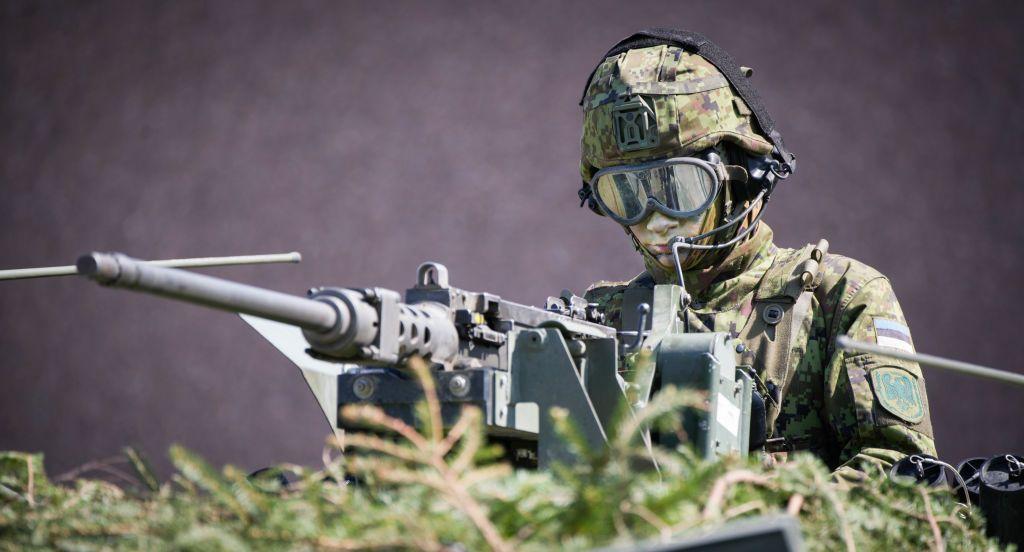Estonia considers itself a frontline state, a NATO member where its border guards stare across the Narva River at Russia’s Ivangorod Fortress.
This small Baltic state, once part of the Soviet Union, is convinced that once the fighting in Ukraine stops, President Vladimir Putin will turn his attention to the Baltic states in an attempt to bring countries like Estonia back under Moscow’s control. to take.
To help prevent that possibility, the Estonian government has poured money and weapons into Ukraine’s war effort, donating more than 1% of the country’s gross domestic product to Kiev.
“If only every NATO country would do this,” says Estonia’s strong prime minister Kaya Kallas“Ukraine would win.”
But Ukraine is not winning.
Without artillery, ammunition, air defenses and, above all, troops, Ukraine struggles to hold back the enormous weight of Russian firepower, hover bombs and massive infantry attacks that often border on suicide.
What is Estonia’s plan B, I asked Prime Minister Kallas, if Ukraine loses this war and Russia’s invasion ultimately succeeds?
“We don’t have a plan B for a Russian victory,” she replies, “because that would take our focus off plan A” – helping Ukraine push back the Russian invasion.
“We should not give in to pessimism. Victory in Ukraine is not just about territory. If Ukraine becomes a member of NATO, even without any territory, it will be a victory because it will be placed under the umbrella of NATO.”
Kaja Kallas is controversial. She is not the first national leader to be more popular outside their country than within it.
Born as a Soviet citizen, her mother and grandmother were forcibly deported to Siberia.
Now 46 and prime minister since 2021, she is one of the most aggressive leaders in NATO when it comes to weakening the Kremlin’s ambitions in Europe. That has some in the White House concerned that she risks dragging the West into direct conflict with Moscow.
Existential threat from Russia
Many Estonians are also not exactly happy with the tax increase to pay for their contribution to Ukraine’s defense. But Kaja Kallas wants the West to wake up to what she sees as an existential threat from a newly aggressive Russia.
“Russia wants to sow fear in our societies,” she tells us, sitting in the cabinet at 10 Downing Street, Estonia’s equivalent, overlooking the towering spiers and ancient castle walls of Tallinn’s Old Town.
“We are seeing several hybrid attacks in many parts of the EU.”
‘Hybrid attacks’, also called ‘sub-threshhold’ or ‘grey zone’ warfare, are hostile actions suspected of being carried out by an adversary such as Russia, which do not necessarily involve shooting, killing no one and often blame is given. difficult to determine – yet the damage can be extensive.
One example that remains unsolved is the mysterious underwater explosions that blew up the Nordstream gas pipelines under the Baltic Sea in 2022. Another example is the recent accusation of Russian electronic interference on flights passing close to the Kaliningrad exclave on the Baltic coast.
In its latest annual report, Estonian internal security service Kapo cites the example of last fall, when hundreds of schools in Estonia and other Baltic states received emails claiming that bombs had been planted in school buildings.
“Such threats,” the report said, “aim to create psychological and emotional tension by targeting the most vulnerable – threatening the safety of children.”
‘Denial is the key to strategy’
How vulnerable is Estonia to a future Russian invasion?
“We must prepare for war so we don’t have another one,” says a NATO officer, speaking on the sidelines of NATO’s Exercise Steadfast Defender.
On Estonia’s southern border with Latvia, aging British Challenger 2 tanks and other armored vehicles from the 1980s weave across farmland, blowing exhaust fumes into the clear spring air.
Russia’s large-scale invasion of Ukraine in February 2022 was something of a wake-up call for the Western alliance. It made NATO leaders realize that they needed to significantly strengthen their military presence on Europe’s eastern flank if they wanted to deter a future Russian invasion.
Today, Britain leads a 1,200-strong battle group based in Tapa, northern Estonia, and consisting of tanks, infantry, artillery, drones and a company of France’s elite mountain infantry.
“The most important part of this denial strategy,” says Brigadier General Giles Harris, who commands British forces here, “is to ensure that we build up enough forces in time to create greater deterrence.”
I point out that 1,200 troops doesn’t seem like a lot, while the one big lesson from the current conflict in Ukraine is that mass matters. Russia may have poor tactics and equipment, but it can deploy such vastly greater numbers of men and ammunition that it is often able to overwhelm Ukrainian defenses.
“Your observation that one battle group is not enough would have been correct a few years ago,” he replies. “But our new plans see us strengthen at a brigade scale (3,000-5,000 troops) ahead of even a brief, small-scale incursion (by Russia).”
“We have a highly readied formation in Britain… to get heavier forces here in time… and it’s a complete change from where we were before.”
The British forces in Tapa and their Estonian partners are keeping a close eye on what is happening in Ukraine.
“It’s a window into the tactical deployment of Russian forces,” said Brig Harris. “We now see our training here in Estonia much more as a rehearsal for a mission, specifically to combat the enemy we see playing out in the south (Ukraine).”
So ultimately I ask him, given the setbacks that Ukraine is currently experiencing, largely due to shortages of ammunition and manpower, whether the British commander is confident that a Russian invasion of Estonia will be successfully repelled?
“Absolutely,” he answers without hesitation. “Now more than ever before.”

